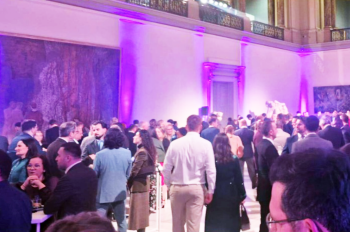
The Pew Research Center recently published some findings that calculated 47% of migrants worldwide are Christians, totaling around 130 million people. So how do churches minister to and learn from migrants, encourage them in their witness to fellow migrants, and support them in ministry to the long-established British population?
What follows are my reflections about how local churches can positively respond to migrants in their communities (surely, now, almost every church in the UK). It should be read in parallel with my previously published opinion, "Why migrants are a means of grace".
You only make first impressions once
The early response of the English churches to migrants from the Caribbean was usually racist and unwelcoming.
How churches have first responded to migrants has enduring consequences. It is widely recognized that the early response of the English churches to migrants from the Caribbean was usually racist and unwelcoming.
In probably the earliest church response to migration in the UK, Clifford Hill’s West Indian Migrants and the London Churches (originally published in 1963) documents the alarming drop from an estimated 69% church attendance in the Caribbean to 4% migrant attendance in London. The consequences of that are still with us. There are still people around who can recall being asked to not return to the church.
The Church of England’s central, but often still not specifically recognized failure as regards race, is its lack of effectiveness with the African Caribbean population. Whilst this is less the case with women and the elderly, the absence of men, and especially young men, is one of the most glaring gaps in the church’s pastoral reach—underlined by the fact that the Church of England still does not have an African-Caribbean male bishop.
Since that disastrous start there has been an increase in our response to migrants, particularly with the speedy and positive response to those who have come from Hong Kong. Though the class factor is also significant here. The positive national welcome to people from Hong Kong noted that they were mostly of well-educated and professional backgrounds, with much to offer to British society.
By contrast the earlier largely artisan Caribbean migrants (along with those from Pakistan and Bangladesh) were a source of cheap labor, competing with the poor in Britain for housing and services.
In between, migration from Africa, which began to swell from the 1980s was received less coldly, partly because of an improving mindset, but also because declining attendances meant that churches discriminated at their peril.
Nevertheless, the lack of cultural understanding by ministers, which Hill noted with Caribbean migrants, diminished African participation in the Church of England, which helped culturally African churches to flourish.
Being different can be good
Clifford Hill positively affirmed "The church is without doubt, the largest and most effective organ for racial integration in the country". Whilst that optimism was often confounded, our fundamental commitment to affirm the dignity and value of all and to extend the gospel’s welcome to all should offer a sharp contrast to the suspicion or coldness that migrants typically encounter.
Churches that are welcoming, informed, and creative in their response to migrants can have a beneficial counter-cultural impact.
Consequently, and given that a disproportionate number of migrants are Christians, churches that are welcoming, informed, and creative in their response to migrants can have a beneficial counter-cultural impact. The result is that people invite friends and relatives. In my experience, sibling church attendance is particularly frequent amongst migrants.
Understandably, given past failures, people are reluctant to visit churches if they are unsure of their welcome, so they are therefore attracted to and attend diaspora churches. However, those churches that are known and seen to be ethnically diverse benefit from the desire of migrants to attend ethnically inclusive churches.
Attend to who attends
Generalized assumptions mislead.
Like all other groups of people, migrants from similar backgrounds can show substantial differences. Generalized assumptions mislead. It can often be the case that migrants who attend our churches are untypical of the wider group that they are part of, particularly if that group is of other faith backgrounds. Several Muslims regularly attended the church where I was vicar but they were of untypical backgrounds, such as Ugandan or Trinidadian.
People may join our churches precisely because they want to distance themselves from their background community. This, of course, is all to the good, as long as we don’t harbor false expectations about how typical they are, or how strong their links with their community. By contrast, the involvement of someone who is seen informally as a major player in that community can have significantly beneficial knock-on effects.
What is needed for churches to minister effectively?
World-wide alertness
Migrants come from places. Church leaders should have a background understanding of what is happening around the world so that migrants who move into the community will encounter some understanding of their background situations.
All church leaders ought to be so-called "World Christians".
When Tamil refugees moved into the parish where I was vicar, I already had—both through friends and awareness of world politics—a reasonable grasp of the issues behind the conflict in Sri Lanka. All church leaders ought to be so-called "World Christians". That is, people who are aware of what is happening around the world, in terms of both politics and Christian witness.
Migrants usually carry with them an intense awareness of what is happening in their country of origin, especially what is happening to their families, to whom they are often sending money. On one occasion during the intercessions, when people in our church were asked about topics for prayer, all the requests were about ‘back home’ situations, such as the suffering of the Yoruba minority in Cameroon.
Intercessions ought to include prayer for areas that congregation members come from. The possibilities of prayer groups for troubled areas of origin can also be an important way of offering support as well as increasing peoples’ sense of belonging to the church through gathering together.
Appreciation
Almost by definition, migrants are people who have come seeking a better life. This may be escaping from persecution or turmoil, or simply because of a desire to get greater prosperity for their family, as well as a better education for their children, by deploying their gifts, whether through manual labor (as was the case in the post-WWII period) or specialist skills and professional capabilities.
"Immigrant optimism" has rightly been coined to express this energized anticipation of a better future
The term "immigrant optimism" has rightly been coined to express this energized anticipation of a better future; and also contrasts helpfully with the too-frequent perception of migrants as huddled masses in need of pity and help, or, alternatively, as a drain on our resources.
In my previous opinion I wrote of migrants as archetypes of Christian faith, as those who model for us what it means to "have the heart of a stranger". More broadly, the experience of being a migrant frequently generates qualities of resilience and enterprise. In the UK we have the fabled Polish plumber and Indian corner-shop owner, which speaks of people bringing energy and initiative to our country that is badly needed. Such energies have been seen not least in Christian migrants.
The extraordinary growth of the Nigerian-originated Redeemed Christian Church of God (RCCG) is a clear example, not only contributing to the increased profile of Christian faith in this country (including footballers making the sign of the cross as they come onto the pitch) but also in service to those in need. For example, the RCCG’s widespread provision of free Christmas lunches.
It is to the Church of England’s loss that it has been reluctant to welcome Christian migrants and therefore missing out on drawing their energies, hope, and vision into its local congregations and ministry. Yet there is encouraging change as we have seen an upsurge in people from migrant backgrounds in training as priests or other ministries in the past few years.
Note also the disturbing fact that all but one of the Church of England’s minority background bishops (none of whom is a male African-Caribbean) are migrants testifies to the weakness of our impact on the British-nurtured children of migrants.
The melding of immigrant optimism with congregations marked by a strong, hopeful, confidence in the transforming, regenerating power of the gospel has the potential to powerfully renew the life of any church.
Immersion
Churches need to be places where migrants are able to fully participate in congregational life.
For that to happen, churches need to be places where migrants are able to fully participate in congregational life, and that is a two-way process.
In a society where they are often unappreciated migrants will only actively participate where, beyond a rather formal welcome, there is a desire by the church to immerse itself as best it can in the life and experience of migrant communities, both in terms of social and political issues and also distinctive cultures. It is important that church leaders set the tone in seeking to immerse themselves in the migrant culture.
In his book, The Christian Imagination, Willie James Jennings writes of Pentecost that,
the Spirit descended on the disciples and drove them into the languages of the world to enact the joining desired by the Father of Jesus for all people. This is the coming of the one new reality of kinship. This is not only the continuation of Jesus work of forming the new Israel in Israel but the full disclosure of the desire of Jesus for the entire world. This in effect, is the Creator reclaiming the world through communion.
Nothing short of this passion for the "joining" of all people will enable the church to discover the opportunities and blessings that migration brings. It will mean entering the world of migrants through giving but most especially receiving hospitality—of encountering new music, films, literature and especially food.
Churches also need to be thoughtful and exploratory as regards different expressions of migrant participation—taking part in, or even organizing complete services, and consider the appropriateness of migrant centered prayer groups, fellowships or regular services. I discuss these possibilities in greater detail in my book, Worship in a Multi-Ethnic Society.
Let all that you do be done in love.
The possible permutations of migrant involvement in the worship, fellowship, leadership, mission and evangelism of the local church are endless. What is essential is a clear vision that such living together is central to God’s purposes for the church, and that we embrace it with joy and commitment. "Let all that you do be done in love" (1 Cor 16:13).
Originally published on John Root's Substack "Out of Many, One People". Republished with permission.
John Root was a curate in the colorfully multi-ethnic residential suburb of Harlesden in the London Borough of Brent. He led an estate church plant in the London Borough of Hackney, planted two Asian language congregations in Wembley, and is now involved with a retirement ministry in Tottenham, still in London.





